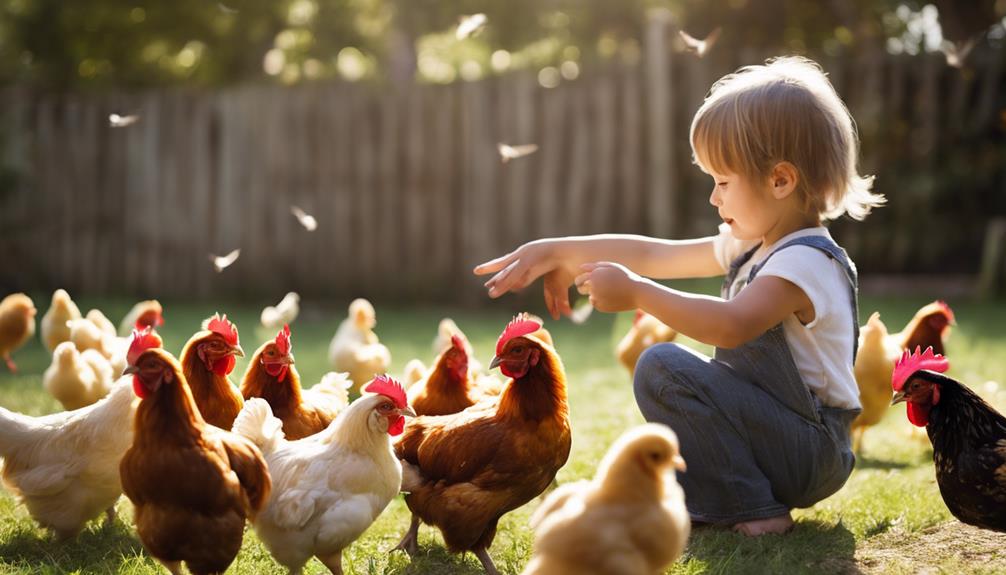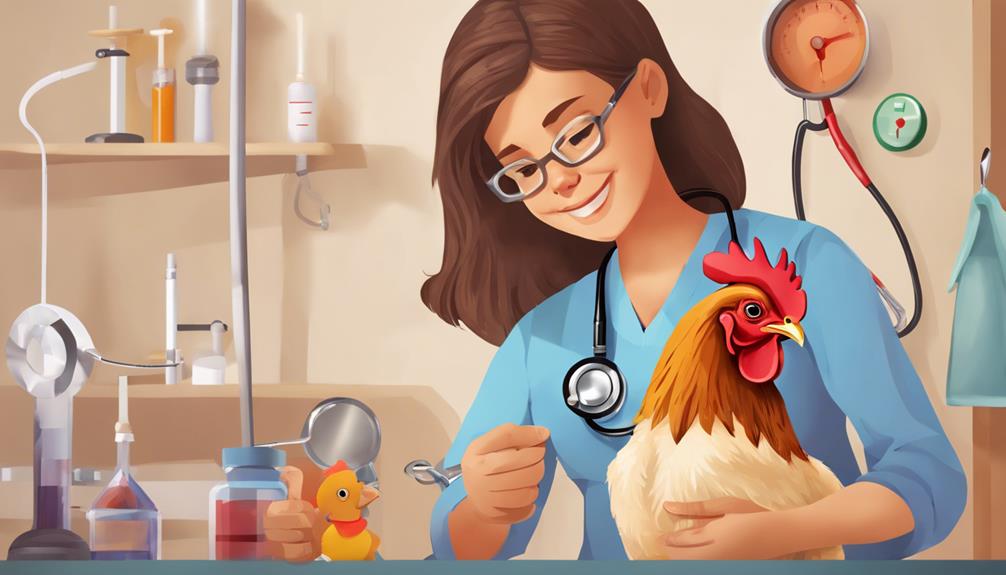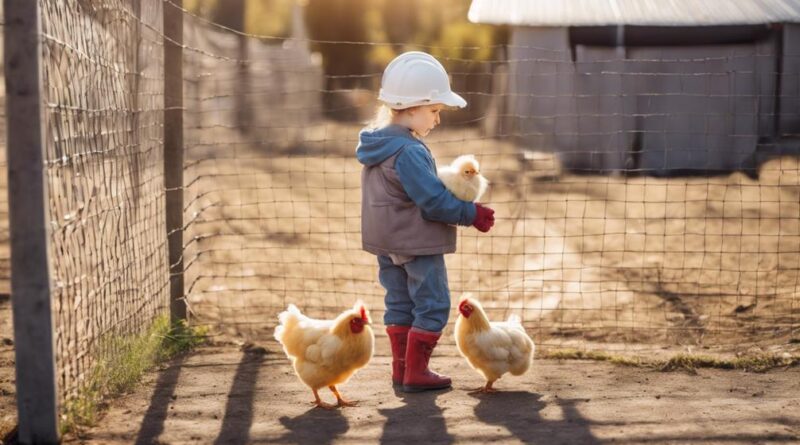10 Best Safety Tips for Kids With Pet Chickens
Ensure children's safety with pet chickens by supervising their interactions, teaching gentle handling, and emphasizing handwashing. Set clear touching boundaries and support chickens properly when picking them up. Maintain a consistent feeding schedule, offer balanced nutrition, and monitor water supply. Secure coop areas with sturdy materials, elevate them, and check for damages regularly. Be mindful of loud noises, toxic plants, and the importance of health checkups. Develop an emergency plan and stock supplies for unforeseen situations. Understanding these safety tips will ensure a positive experience for kids with their pet chickens.
Supervision During Interaction
When interacting with pet chickens, it's crucial to supervise children closely to ensure their safety and the well-being of the birds. Constant supervision is key to preventing any potential mishaps or accidents. Communicate with children about the importance of gentle handling and respecting the chickens' space. Encourage kids to approach the chickens calmly and avoid sudden movements that could startle the birds.
Establish clear boundaries for children when they're around the chickens. Teach them where they can touch the chickens and where they should avoid touching to prevent any stress or harm to the birds. Positive reinforcement is essential in guiding children on appropriate behavior around the chickens. Praise them when they follow the set guidelines and gently correct them if they forget.
Additionally, teach kids the proper way to hold and interact with the chickens. Show them how to support the chicken's body securely to prevent them from flapping or getting scared. Remind children to wash their hands before and after handling the chickens to maintain good hygiene practices and prevent the spread of germs.
Proper Handwashing Techniques
To maintain proper hygiene when interacting with pet chickens, it's important to follow correct handwashing techniques consistently. Proper handwashing starts with selecting a soap that effectively removes dirt and bacteria. Choose a mild soap that's safe for frequent use, as harsh chemicals can be harmful to both your skin and the chickens. When washing your hands, ensure you use enough soap to create a good lather.
Regarding water temperature, opt for warm water as it helps to break down oils and dirt more effectively than cold water. Hot water can be harsh on your skin and may lead to dryness, so lukewarm water is the best choice for handwashing. Make sure the water is at a comfortable temperature to encourage thorough washing.
To wash your hands properly after handling chickens, wet your hands with water, apply soap, and lather for at least 20 seconds. Be sure to scrub all surfaces of your hands thoroughly, including between your fingers and under your nails where dirt and bacteria can hide. Rinse your hands well under clean, running water and dry them with a clean towel or air dryer. By following these handwashing techniques, you can help prevent the spread of germs and keep yourself and your pet chickens healthy.
Gentle Handling Guidelines
For safe and comfortable interactions with your pet chickens, it's important to handle them gently and with care. When picking up your chickens, always approach them calmly and avoid sudden movements. Support their bodies properly by placing one hand under their breast and the other hand supporting their rear end. This helps them feel secure and prevents them from flapping around, which could lead to injuries.
Feather care is an essential aspect of handling chickens. Be mindful not to tug or pull on their feathers, as this can be painful for them. Regularly check for any signs of mites or parasites that could affect their feathers and overall health. Gentle grooming can help keep their feathers clean and free from debris, promoting their well-being.
Creating quiet time for bonding activities with your chickens is crucial. These birds thrive in peaceful environments, so providing them with a calm and quiet space will help them feel safe and secure. Spend quality time with your chickens, talking to them softly and engaging in activities that strengthen your bond.
Training methods can also aid in gentle handling. Use positive reinforcement techniques to teach your chickens to trust you. Offer treats as rewards for good behavior, such as coming when called or allowing you to handle them. Consistent training won't only make interactions more enjoyable but also enhance the relationship between you and your pet chickens.
Safe Feeding Practices
Ensure the well-being of your pet chickens by following safe feeding practices that support their health and nutritional needs. When it comes to feeding your pet chickens, establishing a consistent feeding schedule is crucial. Chickens thrive on routine, so try to feed them at the same times each day. This helps regulate their metabolism and ensures they receive the necessary nutrients regularly.
Understanding your chickens' nutritional needs is essential for their overall health. A balanced diet for chickens typically includes a mix of commercial chicken feed, grains, fruits, vegetables, and occasional treats like mealworms. Ensure their feed is appropriate for their age and any specific health requirements they may have. Providing access to fresh, clean water at all times is also vital for their well-being.
Monitor your chickens' food consumption and adjust their portions as needed. Overfeeding can lead to obesity and health issues, while underfeeding can result in malnutrition. Additionally, be mindful of any food scraps or treats you offer your chickens, as some human foods can be harmful to them. Consult with a veterinarian or poultry expert to determine the best diet plan for your pet chickens based on their breed and individual needs.
Secure Coop and Run Areas
Maintain the security of your coop and run areas to protect your pet chickens from potential threats and ensure their safety. Predator prevention is essential in coop design. Start by using sturdy materials for the coop, such as hardware cloth instead of chicken wire, to prevent predators like raccoons or foxes from breaking in. Ensure that the coop is elevated off the ground to deter burrowing animals. Regularly inspect the coop for any signs of wear or damage that could compromise its security.
Establish clear free-range boundaries to prevent your chickens from wandering into unsafe areas. Use fencing to create a designated free-range space that's secure from predators and other dangers. Check the fencing regularly to look for any gaps or holes that chickens could escape through. Additionally, provide your chickens with ample space to roam within the boundaries to reduce overcrowding and potential conflicts.
Escape prevention is crucial to keep your chickens safe. Regularly check for any gaps in the fencing or areas where predators could potentially dig underneath. Secure all doors and openings to the coop during the night when chickens are most vulnerable to attacks. By implementing these security measures, you can create a safe environment for your pet chickens to thrive.
Understanding Chicken Body Language
To understand your pet chickens better, pay attention to their body language cues as they communicate through various movements and gestures. Chickens use a combination of behavioral cues and communication signals to express their feelings and needs. By observing their body language and vocalizations, you can foster a deeper connection with your feathered friends.
One common body language cue is when chickens puff up their feathers and stand tall. This behavior usually indicates that they're feeling confident or trying to establish dominance within the flock. On the other hand, if a chicken crouches down with its feathers flat against its body, it may be a sign of fear or submission. Understanding these postures can help you gauge the emotional state of your chickens and respond accordingly.
Additionally, pay attention to vocalizations such as clucking, squawking, or chirping. Chickens use different sounds to communicate various messages, from calling out to their chicks to expressing alarm or contentment. By familiarizing yourself with the meanings behind these vocal cues, you can better interpret what your chickens are trying to convey.
Avoiding Loud Noises

When observing your pet chickens, be mindful of avoiding loud noises as they can startle or distress these sensitive birds. Chickens have a high level of noise sensitivity, which means sudden loud sounds can cause them stress and anxiety. To ensure the well-being of your feathered friends, it's important to create a quiet and peaceful environment around them.
Exposure to loud noises can have a range of negative effects on chickens. Not only can it lead to immediate distress, but prolonged exposure may also impact their overall health and egg production. As a responsible chicken owner, it's crucial to be aware of the noise levels in their surroundings.
If you need to engage in activities that produce loud noises near your pet chickens, consider using hearing protection for them. Just like humans, chickens can benefit from having their ears protected from excessively loud sounds. This simple measure can go a long way in keeping your chickens comfortable and stress-free.
Hazardous Plant Awareness
Being aware of hazardous plants around your pet chickens is essential for ensuring their safety and well-being. Chickens are curious creatures that may peck at plants within their reach, making it crucial to identify toxic ones to prevent any potential harm. Some common toxic plants that you should be cautious of include azaleas, daffodils, lilies, and oleander. These plants contain toxins that can be harmful or even fatal to chickens if ingested. It's important to familiarize yourself with these plants and remove them from areas where your chickens roam.
To ensure the safety of your feathered friends, consider planting chicken-friendly vegetation like marigolds, sunflowers, or basil in their living area. These plants not only provide a safe snacking option for your chickens but also add beauty to their environment. Additionally, creating physical barriers such as fencing or raised garden beds can help prevent chickens from accessing hazardous plants in your yard.
In addition to being proactive with plant selection, practicing safety precautions is vital. Regularly inspect your property for any potentially harmful plants and promptly remove them. Educate children and other family members about the importance of avoiding toxic plants around the chickens. By taking these preventive measures, you can create a safe and enjoyable environment for both your kids and their pet chickens.
Health Checkups Routine

Regular health checkups are crucial for monitoring the well-being of your pet chickens and addressing any potential issues promptly. When it comes to maintaining the health of your feathered friends, scheduling regular vaccinations is essential. Vaccinations help protect your chickens from common diseases, ensuring they lead long and healthy lives. Consult with a veterinarian experienced in poultry care to establish a suitable vaccination schedule based on your chickens' specific needs and any prevalent diseases in your area.
In addition to vaccinations, proper grooming is also key to keeping your pet chickens healthy. Regularly inspect your chickens for any signs of mites, lice, or other parasites. If you notice any issues, consult with your veterinarian for appropriate treatment options. Grooming also involves checking your chickens' beaks, nails, and feathers. Trim overgrown nails to prevent them from curling and causing discomfort. Beak maintenance may be necessary if it becomes overgrown, hindering your chicken's ability to eat properly.
Establishing a routine health checkup schedule for your pet chickens is a proactive way to ensure their well-being. By staying on top of vaccinations and grooming, you can help prevent potential health problems and address any issues promptly. Remember, a healthy chicken is a happy chicken!
Emergency Preparedness Plan
To ensure the safety and well-being of your pet chickens in times of unexpected events, developing a comprehensive emergency preparedness plan is essential. Start by establishing clear evacuation procedures. Identify safe locations where you can take your chickens in case of emergencies such as fires, floods, or severe weather. Ensure that all family members are aware of these procedures and practice them regularly to ensure a swift and coordinated response when needed.
Stock up on essential emergency supplies to sustain your pet chickens during unforeseen situations. Maintain a supply of food that can last for at least a week, ensuring it's stored in a cool and dry place. Have a sufficient amount of clean water available at all times. Additionally, keep a first aid kit specifically designed for chickens that includes items like wound care supplies, electrolytes, and medications recommended by your veterinarian.
Regularly review and update your emergency preparedness plan to account for any changes in your living situation or the number of chickens you own. Consider reaching out to local animal shelters or veterinary clinics for guidance on creating a robust emergency plan tailored to your pet chickens. By being proactive and prepared, you can minimize risks and ensure the safety of your beloved feathered friends in times of crisis.
Frequently Asked Questions
Can Pet Chickens Be Trained to Do Tricks?
Yes, pet chickens can be trained to do tricks using positive reinforcement methods. It's essential to understand chicken behavior and utilize rewards like mealworms or seeds to encourage learning.
Training challenges may arise due to chickens' independent nature, but consistency and patience are key. By establishing a routine and using treats as incentives, you can teach your pet chicken fun tricks like pecking a target or jumping through a hoop.
Are There Any Specific Breeds Better for Kids?
When choosing breeds for kids, look for ones known to be friendly and docile. Some child-friendly breeds include Buff Orpingtons, Silkies, and Sussex chickens. These breeds are typically gentle, easy to handle, and good around children.
It's essential to consider temperament and size when selecting a breed for your kids to ensure a positive and safe interaction with their pet chickens.
How Do I Introduce a New Chicken to the Flock?
When introducing a new chicken to your flock, start by isolating the newcomer in a separate but adjacent space for a few days. This allows the chickens to see and smell each other without direct contact.
When integrating the new chicken, supervise interactions to prevent aggression and establish the pecking order. Gradually, allow them to socialize more closely, monitoring their behavior for signs of bullying or distress.
Be patient as flock dynamics adjust to the new addition.
What Do I Do if a Chicken Gets Sick?
If a chicken gets sick, it's crucial to act promptly. Keep a close eye on their behavior and look for any signs of illness.
If you notice any abnormal symptoms, contact a veterinary specializing in chicken care immediately. Early detection is key to their health and prevention of spreading illness to the rest of the flock.
Consult with a professional to ensure proper treatment and care for your feathered friend.
Can Kids Play With Chickens Unsupervised?
You should never let kids play with chickens unsupervised. Chicken behavior can be unpredictable, and supervision is crucial to ensure safety.
Make sure to teach children about safety precautions when interacting with the chickens. Set boundaries for playtime and always have an adult present to monitor the interaction.
Conclusion
In conclusion, by following these 10 safety tips for kids with pet chickens, you can ensure a safe and enjoyable experience for both your child and their feathered friends.
Remember to always supervise interactions, practice proper handwashing techniques, handle chickens gently, and secure coop areas.
By being aware of potential hazards and having a plan in place for emergencies, you can create a positive and nurturing environment for your child and their beloved pets.
